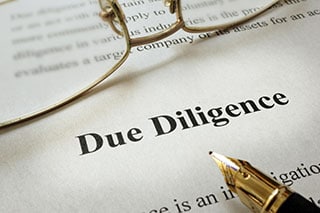How to Buy a Dental Practice: The Due Diligence Process

The process of evaluating a dental practice acquisition opportunity is often referred to as “due diligence”. Due diligence is an essential part of purchasing a practice, as it allows the buying dentist to fully examine the seller’s practice and confirm the material facts provided by the seller or practice broker. When learning how to buy a dental practice, buyers often ask us questions regarding how to go about completing their due diligence, so we offer this two part article as a brief guide to this process.
First, let’s examine the meaning of due diligence. According to investopedia.com, due diligence is defined as:
- An investigation or audit of a potential investment. Due diligence serves to confirm all material facts in regards to a sale.
- Generally, due diligence refers to the care a reasonable person should take before entering into an agreement or a transaction with another party.
The due diligence process begins upon the buyer receiving the initial information regarding the practice and typically continues for 15-20 days following the execution of a Letter of Intent to purchase the practice. The staff and patient base are usually unaware that the practice is being offered for sale, so buyers are expected to complete their due diligence in a confidential manner and visit the practice after business hours.
There are several key areas for buyers to focus their attention during the due diligence process:
Practice Information, Reports & Financials – The buyer will need the following information to properly evaluate the practice: Practice Questionnaire (provided by the broker or lender), Office Lease, Fee Schedule, Accounts Receivable Aging Summary, Production by Provider, Category & Procedure Code Reports, Last 3 Years Profit & Loss Statements and/or Practice Tax Returns, and Current Year P&L Statement.
Practice Visit – Once the buyer has reviewed the practice information and determined they have a strong interest in the opportunity, the next step is visiting the practice in person to evaluate the location, facility, equipment, décor, etc. During this meeting with the seller or practice broker, the buyer should ask any questions they may have regarding the practice information.
Meet the Seller – Once the buyer has reviewed the practice information and visited the office, it is important for them to meet with the seller. During this meeting the buyer should get to know the seller on a personal and professional level, observe the seller’s personality, discuss the seller’s practice philosophy, review why the seller is selling the practice, discuss the seller’s involvement during the transition and following the sale, and ask the seller any questions they have regarding the practice, patient base, staff, etc. After meeting with the seller, the buyer should have a much better feel for the practice and be able to determine if the practice is a good fit for them.
Chart Audit, Practice Management Software, Fee Schedule & Appointment Book – The buyer may want to pull a sample of active patient charts to review the seller’s notes, practice philosophy, and the type of treatment being provided. Some buyers will hire a practice management consultant to assist them with completing the chart audit, evaluating the seller’s fee schedule to see how it compares with other practices in the area, and reviewing the practice management reports/software to verify the information provided by the seller or broker and identify strengths and weaknesses of the practice. The buyer may also want to review the appointment book to gain insight into the seller’s work flow and the historical and future busyness of the practice.
Equipment Inspection – The buyer or a local dental equipment representative should inspect all of the equipment to ensure that it is in good working order prior to the sale. The buyer should also request a room by room equipment list, which should be included in the Asset Purchase Agreement.
Verification of Information – The buyer’s lender will typically file a 4506 Form with the IRS to verify the seller’s practice tax returns are true and correct. The buyer may also want to peruse the practice management software to confirm the accuracy of the active patient count and other practice information provided by the broker and/or seller.
Cash Flow Analysis – The buyer and/or the buyer’s lender or accountant should complete a cash flow analysis to confirm the practice generates sufficient cash flow to pay the overhead of the practice and the debt service associated with the practice loan while providing the buyer with sufficient personal income to cover their living expense needs. The practice broker may also provide a cash flow analysis to the buyer. Please note that a cash flow analysis may not be applicable to smaller practices that are priced based primarily upon the replacement value of the leasehold improvements/equipment and the future potential of the practice.
Future Potential – The buying dentist should evaluate the potential for reducing overhead and/or enhancing practice revenue through decreasing expenses by switching labs or dental supply companies, increasing internal or external marketing, increasing operating hours, retaining services that are not being provided by the seller, increasing the fee schedule, etc.
Ongoing Expenses – The buyer needs to have a firm understanding of the overhead and ongoing expenses of the practice, including the major overhead expenses such as office rent, staff, dental supplies, lab, and advertising as well as any contracts that will be assumed after the sale such as maintenance contracts, equipment leases and warranties, and advertising contracts. In addition to the monthly rental rate for the office space, the assignability and term (including options to renew) of the lease are also important considerations.
Taking a focused, organized approach to the due diligence process will allow the buying dentist to make an informed, confident purchasing decision and set the foundation for a successful transition.
